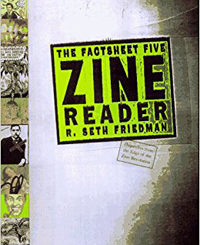 Pink Flamingos
Pink Flamingos
The 25th Anniversary Edition
with Divine, Mink Stole, David Lochary, Edith Massey, Mary Vivian Pearce, Cookie Mueller, and Danny Mills
Written, Produced, Directed and Filmed by John Waters (Fine Line Features)
by William Ham
Bitch and moan about it as I may, the great thing about pop culture, the thing that keeps me coming back to the trough with moistened snout and truffled breath, is that its essence is self-correcting, ever-wobbling, yes, but always mysteriously righting itself and therefore giving me hope about the existence of balance in this seemingly entropic bowl of spoiled malaise we call the universe. (Wow. Weebles as cosmic metaphor.) The present year is thick with re-releases of “classic” films, particularly the twentieth-anniversary return of the myth, mysticism, and merchandising triptych known as the Star Wars series, the American philm phenom whose surprise success triple-handedly set the soundstage for the annual game of one-upmanship known as the Summer Blockbuster (the world’s most expensive junk food). I have nothing against the occasional ingestion of empty calories, but insofar as staying power is concerned, very little tends to remain from these state-of-the-art-at-press-time-special-effects-and-product-placement spectacles other than a hollow, dyspeptic belch that dissipates as soon as it hits the air. After a while, you want sustenance that sticks to your ribs, however fetid and foul-tasting it may be.
Allow me, then, to shriek a hymn of praise to the quarter-century re-emergence of America’s own cinematic Sleazehenge, the cross-dressing, merde-munching, pullet- humping Godfather of celluloid atrocities, John Waters’ Pink Flamingos. The man William S. Burroughs christened “the Pope of Trash” is, at this late date, damn near respectable, mainly because his talent for transgression and our culture’s taste for the same have finally crossed paths (and culturally, we seem to have even passed him – lest we forget, this is the man who introduced Ricki Lake to the world, only to see her become less respectable on her own). His more recent work, from 1988’s Hairspray on, has been readily outgrossed (in both senses of the word) by the likes of Kingpin, Dumb and Dumber, and the Ace Ventura movies (in which Jim Carrey requires the use of both hands to merely simulate the “Singing Asshole” routine in Flamingos – and this guy gets $40 mil a picture?). Waters’ subversion is strictly mainstream now, which, granted, provides neat kicks of its own (from casting Patty Hearst as a straitlaced ’50s mom [to Traci Lords, no less] in Cry-Baby, to having Sam Waterston crowdsurf and Kathleen Turner say lines like “Hello, is this the cocksucker residence?” in Serial Mom), but has left a whole generation deprived of the true depravity that was once his trademark. But now, like a boil beneath the skin of cinema, his most famous film has re-surfaced to show these young pikers how this outrageous comedy thing is really done.
This film, to put it mildly, is a bit of a shocker. Later films (like Female Trouble and Desperate Living) are more refined, if that’s the word, pieces of filmmaking, but nothing Waters has made before or since revels in perversity to quite the degree Flamingos does, with scenes guaranteed to offend absolutely everybody (even the director blanches at some of it now). In addition to the doggie-chow denouement, there’s the “chicken-fuck” scene (yes, animals were harmed in the making of this film), actual on-screen fellatio, a pre-op transsexual showing off “her” varied bill of goods, and an artificial insemination scene that renders the whole Sharon Stone uncrossed-leg melée tame. (And Ted Turner thought that Fine Line shouldn’t release Crash?) Waters is far from the only artist to exploit filth for fun and profit. In the intervening two-and-a-half decades, agressive transgressors from Richard Kern and Nick Zedd to G.G. Allin have made their own hashmarks on the underside of art – so what makes this film so special, so singular, where other “underground” movies have lost their luster like the faded colors of a bad print? One reason could be that it’s one of the least oppressive comedies ever made. It seeks not to ingratiate, to cajole you into some bogus illusion of warmth and happiness; in truth, it offers you options other than to laugh. It dares you to laugh, certainly – practically every single gag (and what depth that word has here) is based in disgust and horror – but it also knows that a scream, a cry of outrage, or a simple “What the fuck?” (all heard at the critics’ screening I attended) are equally valid forms of release. Most of the comedies released nowadays strain so frenetically for laughs that their ninety minutes seem to take about three painful hours. Either that, or they utilize a distancing hipness which absolves them from any responsibility. It’s just a movie. We don’t believe any of this, it says while outwardly reveling in dehumanizing jokes and verbal/physical abuse – Teflon-over-celluloid; nothing sticks to them, and rarely do they stick with you. On the other hand, chortling derisively at unintentionally funny garbage gets old after a while, and the worst culprits of them all are those that knit their brows trying to have it both ways (viz. the third-hand Tarantinos that are, as we speak, causing dollar-a-night shelves at video stores worldwide to buckle under their dead weight). John Waters wants no part of this touchy-feely ooh-that-tickles crap. You can’t walk away from Pink Flamingos unmoved, whether you’re scrambling for the vomit-bag or clutching your ribs in hysterics (or both). This is what we call respect for the audience.
Another explanation is that, for all the bad acting, wobbly camera work and choppy editing (all dictated by the mercenary necessities of low-budget filmmaking), underneath the shock tactics lies a real movie with defined characters and a sure sense of pace. Divine and “her” trailer-dwelling clan are indeed filthy, but good-naturedly so. Sure, they have their quirks (mother Edie [Massey] is obsessed with eggs, traveling companion Cotton [Pearce] is a voyeur, and hillbilly son Crackers [Mills] likes to bring poultry to bed with him when not receiving blowjobs from Mama), but on their terms, it’s an idyllic existence. The evil Marbles (Lochary and Stole), conversely, give filth a bad name. They’re jealous (covetous of Divine’s title), cruel (they kidnap women, have their servant impregnate them, and sell the babies to lesbian couples), and repressed (sex for them goes no further than toe-sucking). At its base (and boy, is it base), it’s a class struggle among people who have no class, a perverse take on one of drama’s classic themes.
Waters also betrays his innate artistry through homage and possibly even symbolism (although such Cahiers du Cinema territory is dangerous and heavily land-mined, so I promise to tread softly here). Divine is justly Waters’ premiere creation, a grotesquely distended glamour girl figure, the funhouse/freak show version of Jayne Mansfield (underscored by his choice of “The Girl Can’t Help It” as the soundtrack for the starlet’s sashay through downtown Baltimore). Edie the Egg Lady, similarly, is a downscale surrealist nod to one of his favorite films, Baby Doll (note the movie poster in the Marbles’ home). That, instead of Carole Baker as a nymphet in a cradle, he uses the heavy, toothless Massey wearing a bra and girdle in a playpen is merely the master’s line in full effect. Waters’ love for the exploitation games of Russ Meyer, Herschell Gordon Lewis and gimmickster William Castle amply endows this work, but his dirty little secret is that he lifts as freely from the art house as he does from the drive-in, swiping schema from film snob faves like Bunuel, Warhol and Duras. (His genius is the knowledge that one film ghetto is innately identical to the other, that art and trash rely on the same skewed view of the world.) As for the symbolism, well, I’d like to book a symposium of semioticians, psychiatrists, and gynecologists to debate the import of the chicken/egg imagery that runs rampant through the picture and draw the appropriate parallels between fecundity and fecal matter, birth and death, and the full spectrum of bodily fluids visible from start to finish, but why go to all the trouble? Pink Flamingos is, I think, a simple parable about the triumph of life in all its messy, gooey glory over the agents of constraint that stifle its expression. You heard me right – this is a far more moral, inspirational and life-affirming story than any of the bogus heartwarmers that get trotted out whenever Hollywood wants to assuage its collective guilt and feel good about itself.
Okay, I’d better lay off the pretentious proselytizing before they send me away for Critics’ Reprogramming (it’s a scary process, believe me – kinda like what they did to Alex in A Clockwork Orange, except they force you to watch Rex Reed’s performance in Myra Breckinridge until you’re sufficiently beaten down and can only speak in ecstatic, lobotomized sound bytes – look into the eyes of Susan Granger of American Movie Classics sometime and you’ll see what I mean). The fact that Waters didn’t feel the need to pull a Lucas and add digitally-enhanced turds or something to jazz it up, coupled with his wise choice to tack the bonus footage on to the end of the film so as not to sully its purity, is evidence enough that Pink Flamingos still acheives its ends just as nicely as it did 25 years ago without resorting to technical jiggerypokery to beat the audience into open-mouthed awe. In fact, what Fine Line should do is show up the Force altogether, re-release Waters’ mid-’70s “Trash Trilogy” (“Desperate Living: The Special Edition! Now with 25% more cannibalism!”) and set the merchandising burners to full blast. Let’s tear up the toy stores! Pull the Millenium Falcon off the shelves and put a gaudy trailer in its place! Replace Barbie with Babs (much more interesting accessories)! Give us toy furniture that rejects its owners when you salivate on it! A “Singing Asshole” doll instead of Tickle-Me Elmo! And a dog that… Well, you get my point. God bless you, Mr. Waters. May the Filth be with you.



